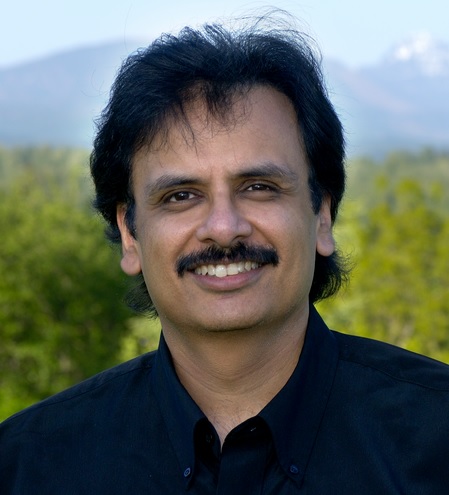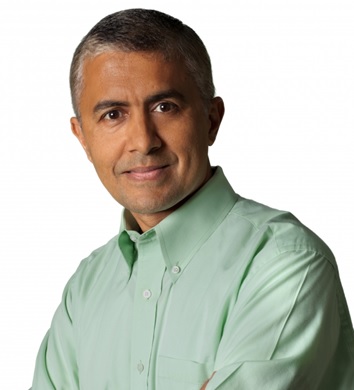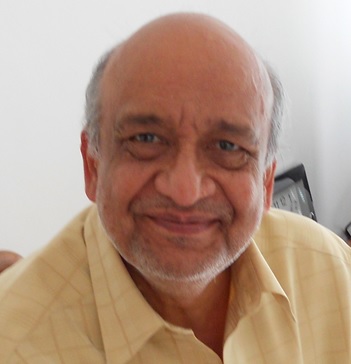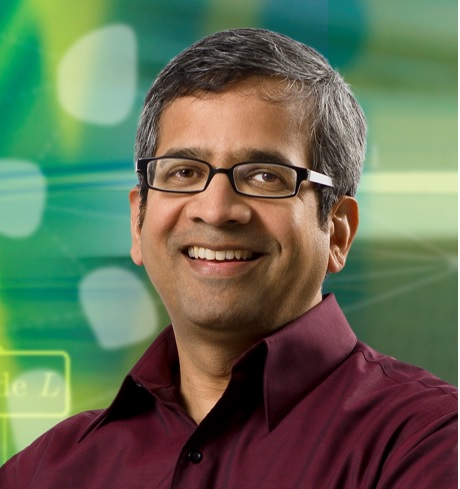![]()
![]()
![]()
Keynote & Plenary Speakers
(Speakers listed in name alphabet order)

Victor Bahl (ACM/IEEE/AAAS Fellow, ACM Distinguished Speaker, IEEE Distinguished Lecturer)
Principal Researcher and
Director,
Microsoft, USA
Keynote Talk Title:
Cloud 2020: The Emergence
of Micro Datacenter for Mobile Computing
Time: 8:30-9:30AM,
Thursday, Feb. 19, 2015
Abstract:
Resource poverty is a fundamental constraint that severely limits the types of applications that can be run on mobile devices. This constraint is not just a temporary limitation of current technology but is intrinsic to mobility. In this talk, I will put forth a vision that breaks free of this fundamental constraint. In this vision, mobile users seamlessly utilize nearby computers to obtain the resource benefits of cloud computing without incurring WAN delays and jitter. Rather than relying on a distant cloud the client connects and uses a nearby micro datacenter (mDC). Crisp interactive response for immersive applications that augment human cognition are then easier to achieve. While much engineering and research remains, the concepts and ideas introduced in this talk open the door to a new world of disaggregated computing in which seamless cognitive assistance for users can be delivered at any time and any place.
Biography:
Victor Bahl is a
Principal Researcher and Director of the Mobility & Networking Research (MNR)
Group in Microsoft Research. MNR's mission is "to invent & research technologies
that make Microsoft's networks, services and devices indispensable to the
world". In addition to pursuing untethered research and shepherding brilliant
researchers, Victor helps shape Microsoft's long-term vision related to
networking technologies by advising Microsoft’s senior executive team and
through associated policy engagement with governments and industries around the
world. He and his group have had far-reaching impact on the research community.
Government policy, and Microsoft products through many significant technology
transfers. His personal research spans a variety of topics in mobile computing,
wireless systems, cloud services and datacenter networking & management. Over
his career he has built many highly cited seminal systems, published
prolifically in top conferences and journals, authored over 110 patents, given
over 35 keynote talks, won numerous awards and honors including ACM SIGMOBILE’s
Lifetime Achievement (Outstanding Contributions) Award and IEEE Outstanding
Leadership and Professional Service Award, and has engaged in significant
professional and company-wide leadership activities. Victor received his PhD
from the University of Massachusetts Amherst in 1997. He is a Fellow of the
ACM, IEEE and AAAS.

Michael I. Jordan (NAS member, NAE member, AAAS member, ACM/IEEE/AAAS/AAAI/ASA/CSS/IMS/ISBA/SIAM Fellow)
Pehong Chen Distinguished Professor,
University of California, Berkeley, USA
Keynote Talk Title:
On the
Computational and Statistical Interface and "Big Data" (PPT1,
PPT2)
Time: 8:30-9:30AM,
Tuesday, Feb. 17, 2015
Abstract:
The rapid growth in the size and scope of datasets in science and
technology has created a need for novel foundational perspectives on
data analysis that blend the statistical and computational sciences.
That classical perspectives from these fields are not adequate to
address emerging problems in "Big Data" is apparent from their sharply
divergent nature at an elementary level---in computer science, the
growth of the number of data points is a source of "complexity" that
must be tamed via algorithms or hardware, whereas in statistics, the
growth of the number of data points is a source of "simplicity" in that
inferences are generally stronger and asymptotic results can be
invoked. I present several research vignettes on topics at the
computation/statistics interface, including work on parallel/distributed
machine learning and on the interface between learning and privacy.
[Joint work with John Duchi, Xinghao Pan, Yuchen Zhang, Joseph
Gonzalez, Stefanie Jegelka, Joseph Bradley and MartinWainwright.]
Biography:
Michael I. Jordan is the Pehong Chen Distinguished Professor in the
Department of Electrical Engineering and Computer Science and the Department of
Statistics at the University of California, Berkeley. His research interests
bridge the computational, statistical, cognitive and biological sciences, and
have focused in recent years on Bayesian nonparametric analysis, probabilistic
graphical models, spectral methods, kernel machines and applications to problems
in distributed computing systems, natural language processing, signal processing
and statistical genetics. Prof. Jordan is a member of the National Academy of
Sciences, a member of the National Academy of Engineering and a member of the
American Academy of Arts and Sciences. He is a Fellow of the American
Association for the Advancement of Science., He has been named a Neyman Lecturer
and a Medallion Lecturer by the Institute of Mathematical Statistics, and has
received the ACM/AAAI Allen Newell Award. He is a Fellow of the AAAI, ACM, ASA,
CSS, IEEE, IMS, ISBA and SIAM.

Larry Peterson (NAE member, ACM/IEEE Fellow)
Robert E. Kahn Professor,
Princeton University, USA
Keynote Talk Title:
OpenCloud: A
Value-Added Cloud for Network Operators
Time: 8:30-9:30AM,
Wednesday, Feb. 18, 2015
Abstract:
The Cloud is rapidly changing the face of the Internet, building on two disruptive technologies: multi-tenant virtualized clusters and Software Defined Networks (SDN). Multi-tenant virtualized clusters enable scale-out designs with flexible resource use and good cost/performance. SDN makes it possible to both manage complexity and customize the network. These technologies are being deployed throughout the Internet; they are not limited to the data center. Network operators are migrating away from purpose-built hardware appliances and moving towards infrastructure that exploits virtualized commodity servers and SDN at the very edge of the Internet, a practice being called Network Functions Virtualization (NFV). This talk puts forward a vision for a Value-Added Cloud that demonstrates how network operators can take advantage of cloud technology. It also describes a prototype, called OpenCloud, that we are building with Internet2.
Biography:
Larry Peterson is the Robert E. Kahn Professor of Computer Science, Emeritus
and Director of the Princeton-hosted PlanetLab Consortium. He served as Chair of
the CS Department from 2003-2009. In 2007 Peterson co-founded CoBlitz LLC to
commercialize CDN technology developed on PlanetLab. CoBlitz was acquired by
Veriue Inc. in 2010, and subsequently by Akamai in 2012. Peterson is co-author
of the best selling networking textbook Computer Networks: A Systems Approach
(5e), and chaired the initial planning efforts that led to NSF's GENI
Initiative. His research focuses on the design and implementation of networked
systems. Some of his recent projects and papers can be found here.
Professor Peterson is a former Editor-in-Chief of the ACM Transactions on Computer Systems, was on the Editorial Board for the IEEE/ACM Transactions on Networking and the IEEE Journal on Select Areas in Communication, and served as program chair for SOSP, NSDI, and HotNets. Peterson is a member of the National Academy of Engineering, a Fellow of the ACM and the IEEE, the 2010 recipient of the IEEE Kobayashi Computer and Communication Award, and the 2013 recipient of the ACM SIGCOMM Award. He received his Ph.D. degree from Purdue University in 1985.

Ramesh Govindan (ACM/IEEE Fellow)
Northrop Grumman Chair
Professor, University of Southern
California, USA
Plenary Talk Title:
Every Millisecond Counts (PPT)
Time: 13:30-14:30,
Tuesday, Feb. 17, 2015
Abstract:
Over the last 5 years, the advent of mobile and cloud computing has radically altered the structure of the Internet. These advances, together with the increasing economic importance of the Internet, has prompted end-to-end extreme engineering of networks with the aim of improving tail performance. In this talk, I will review recent advances in engineering for low latency access to web services. Latency impacts revenue, so large service providers like Google have been taking extraordinary steps to engineer their infrastructures to achieve millisecond-level latency improvements, by improving alignment of routing and topology with geography, ensuring proximity to clients, and optimizing delivery. I will present some work that quantifies these improvements and will discuss what these advances portend for networking research.
Biography:
Ramesh Govindan is the Northrop Grumman Chair in Engineering and Professor of Computer Science and Electrical Engineering at the University of Southern California. He received his B. Tech. degree from the Indian Institute of Technology at Madras, and his M.S. and Ph.D. degrees from the University of California at Berkeley. His research interests include routing and measurements in large internets, networked sensing systems, and mobile computing systems. He is a Fellow of the ACM and of the IEEE, a former Editor-in-Chief of the IEEE Transactions on Mobile Computing, and a Distinguished Alumnus of the Indian Institute of Technology, Madras.

Ramesh Jain (ACM/IEEE/AAAI/IAPR/SPIE Fellow)
Donald Bren Professor in
Information & Computer Sciences, University of California, Irvine, USA
Plenary Talk Title:
Building Smart Social Systems (PPT)
Time: 13:30-14:30,
Wednesday, Feb. 18, 2015
Abstract:
One of the most challenging problems in human society is to connect needs of people to appropriate resources efficiently, effectively, and promptly. Availability of enormous volumes of heterogeneous Cyber-Physical-Social (CPS) data streams allows design and implementation of networks to connect various data sources to detect situations with little latency. In fact, in many cases it may even be possible to predict situations well in advance. This opens up new opportunities in designing smart social systems for specific tasks. Such systems are very useful for many important problems at local as well as regional and even global level. Such systems offer many novel challenges to researchers in big data, multimedia, networking, and social computing. We will present our approach towards building social life network that are first step towards such smart social systems. In particular, EventShop can be used to input and process heterogeneous data streams for we situation recognition and availability of resources; while Personal EventShop can be used to build Personicles and identify evolving personal situation and needs. This can then be used for connecting needy people with appropriate resources. This approach has been tested with several simple applications. In addition to the technical approach, its implications for emerging societal applications will be discussed.
Biography:
Ramesh Jain is an entrepreneur, researcher, and educator. He is a Donald Bren Professor in Information & Computer Sciences at University of California, Irvine where he is doing research in Event Web and experiential computing. Earlier he served on faculty of Georgia Tech, University of California at San Diego, The university of Michigan, Ann Arbor, Wayne State University, and Indian Institute of Technology, Kharagpur. He is a Fellow of ACM, IEEE, AAAI, IAPR, and SPIE. His current research interests are in processing massive number of geo-spatial heterogeneous data streams for building Smart Social System. He is the recipient of several awards including the ACM SIGMM Technical Achievement Award 2010.
Ramesh co-founded several companies, managed them in initial stages, and then turned them over to professional management. These companies include PRAJA, Virage, and ImageWare. Currently he is involved in Stikco and SnapViz. He has also been advisor to several other companies including some of the largest companies in media and search space.

Monica Lam (ACM Fellow)
Professor,
Stanford University, USA
Plenary Talk Title:
Omlet: A Foundation for a Paradigm Shift from Centralized
to Distributed Computing
Time: 8:30-9:30AM,
Monday, Feb. 16, 2015
Abstract:
While centralized
big-data systems might be perfect for indexing the public web, they are
inappropriate for recording the personal utterances and actions of the
entire human kind. Having so much knowledge and power be accumulated
and owned by a single proprietary entity would not only be a huge
invasion of privacy, but would also stifle open competition and
innovation. Mobile devices create both a need and an opportunity for
distributed computing.
Omlet, the result
of 4 years of research at Stanford followed by 2 years of
commercialization, is an attempt to create a new foundation to support
user-friendly, distributed computing on mobile devices and the internet
of things. To the user, Omlet appears as a super chat app with many
plug-ins and extensions; deep down, Omlet is actually a distributed
social OS and network. At the heart of Omlet is a universal messaging
system where devices can communicate with each other via existing
identities such as phone numbers or email addresses, without giving up
ownership of the communication data. Built upon this messaging layer is
a distributed semantic file system that enables collaborative apps be
written easily while allowing data be distributed in the cloud service
of the users' choice.
Launched in March
2014, Omlet, available on the iPhone and the Android devices, has
already been distributed to millions of phones. Because of its data
protection policy, Omlet is a suitable foundation for social
applications in education, commerce, finance, internet-of-things, and
any other domains where intellectual property needs to be respected.
Biography:
Monica S. Lam has been a Professor in the Computer Science Department at Stanford University since 1988; she is also the founding Director of the Stanford MobiSocial Computing Laboratory. She received her BS in Computer Science from University of British Columbia and her PhD in Computer Science from Carnegie Mellon University. Her research results, commercialized by startups she co-founded, disrupted the status quo in three different areas. Omlet is the first messaging and social network that does not monetize users' data; MokaFive lets businesses manage desktops virtually, and Tensilica adds configurability to processors in SoCs (system-on-a-chip). She is a co-author of the most popular compiler textbook, often called the Dragon book. She is an ACM Fellow.

Anna Scaglione (IEEE Fellow)
Professor, Arizona
State University, USA
Plenary Talk Title:
Signal Processing and Communication Challenges for the Internet of
Energy (PPT)
Time: 14:30-15:30,
Tuesday, Feb. 17, 2015
Abstract:
In this talk we will discuss signal processing models of the behavior of electric appliances that can support the smart electric power grid. An ecosystems of Electric Vehicles, Smart Thermostats and Smart Lighting will allow customers to interact with the market of electricity directly, optimizing the customer preferenceswhile better exploiting the variable production from renewable energy, from distributed ``prosumers” and centralized plants alike. The opportunities for good are immense but there are several challenges. Unlike the internet, which is managed in a decentralized fashion, power systems are large vertically integrated infrastructures and, thus, the interaction between market forces is hampered by the curse of dimensionality. We will discuss the issue of sifting through big data to decide the schedule and closing the loop on a large number of transactions. While the grid is already coping with significant vulnerabilities as is the Internet of Energy can significantly expand the reach of malicious cyber-attacks. We will touch upon the issue of cyber-security and privacy that arise in general with the Internet of Things and with the Internet of Energy in particular.
Biography:
Anna Scaglione (M.Sc.'95,
Ph.D. '99) is currently a professor in electrical and computer engineering at
Arizona State University. She was Professor of Electrical Engineering previously
at the University of California at Davis (2008-2014), after a six-year term at
Cornell (2001-2006). Prior to joining the engineering faculty at Cornell,
Scaglione was an assistant professor at the University of New Mexico
(2000-2001).
Dr. Scaglione’s expertise is in the broad area of statistical signal processing
for communication, electric power systems and networks. Her current research
focuses on studying and enabling decentralized learning and signal processing in
networks of sensors. She also focuses on sensor systems and networking models
for cyber security in critical infrastructure and for the demand side management
and reliable energy delivery and in other aspects at the intersection between
intelligent infrastructure, information systems and social networks.
Dr. Scaglione was elected an IEEE fellow in 2011. She received the 2000 IEEE
Signal Processing Transactions Best Paper Award and more recently was honored
for the 2013, IEEE Donald G. Fink Prize Paper Award for the best review paper in
that year in the IEEE publications, her work with her student earned 2013 IEEE
Signal Processing Society Young Author Best Paper Award (Lin Li).

Venugopal V. Veeravalli (IEEE Fellow, IEEE Distinguished Lecturer)
Professor, University of Illinois at Urbana-Champaign, USA
Plenary Talk Title:
Flexible Backhaul Design for Cellular Interference
Management (PPT)
Time: 14:30-15:30,
Wednesday, Feb. 18, 2015
Abstract:
Enhancements in the backhaul infrastructure are anticipated in future generation cellular networks. In this talk, we explore the potential benefits of having a more flexible backhaul. For the cellular downlink, we study assignments of messages to base station transmitters and Coordinated Multi-Point transmission based coding schemes that deliver the promise of interference alignment while meeting delay requirements. In particular, we highlight the importance of basing the decisions for cell associations as well as assignments of messages over the backhaul on the knowledge of the structure of dominant interfering links. We observe that the optimal designs differ dramatically based on the network topology. In practice, the topology can change because of deep fading conditions and network dynamics, and we therefore introduce a dynamic interference network model and consider backhaul designs for this model. In the last part of the talk, we discuss dual designs in a cellular uplink model where the base station receivers can share decoded messages through the backhaul. (This is joint work with Dr. Aly Elgamal and Dr. Sreekanth Annapureddy.)
Biography:
Prof. Veeravalli received the Ph.D. degree in Electrical
Engineering from the University of Illinois at Urbana-Champaign in 1992,
the M.S. degree from Carnegie-Mellon University in 1987, and the B.Tech
degree from Indian Institute of Technology, Bombay (Silver Medal Honors)
in 1985. He is currently a Professor in the department of Electrical and
Computer Engineering (ECE), the Coordinated Science Laboratory (CSL) and
the Information Trust Institute (ITI) at the University of Illinois at
Urbana-Champaign. He was on the faculty of the School of ECE at Cornell
University before he joined Illinois in 2000. He served as a program
director for communications research at the U.S. National Science
Foundation in Arlington, VA during 2003-2005. His research interests
include wireless communication, sensor networks, detection and
estimation theory, statistical signal processing and information
theory. He is a Fellow of the IEEE, and a recipient of the 1996 IEEE
Browder J. Thompson Best Paper Award and the U.S. Presidential Early
Career Award for Scientists and Engineers (PECASE). He served as a
distinguished lecturer for the IEEE Signal Processing Society during
2010-2011.